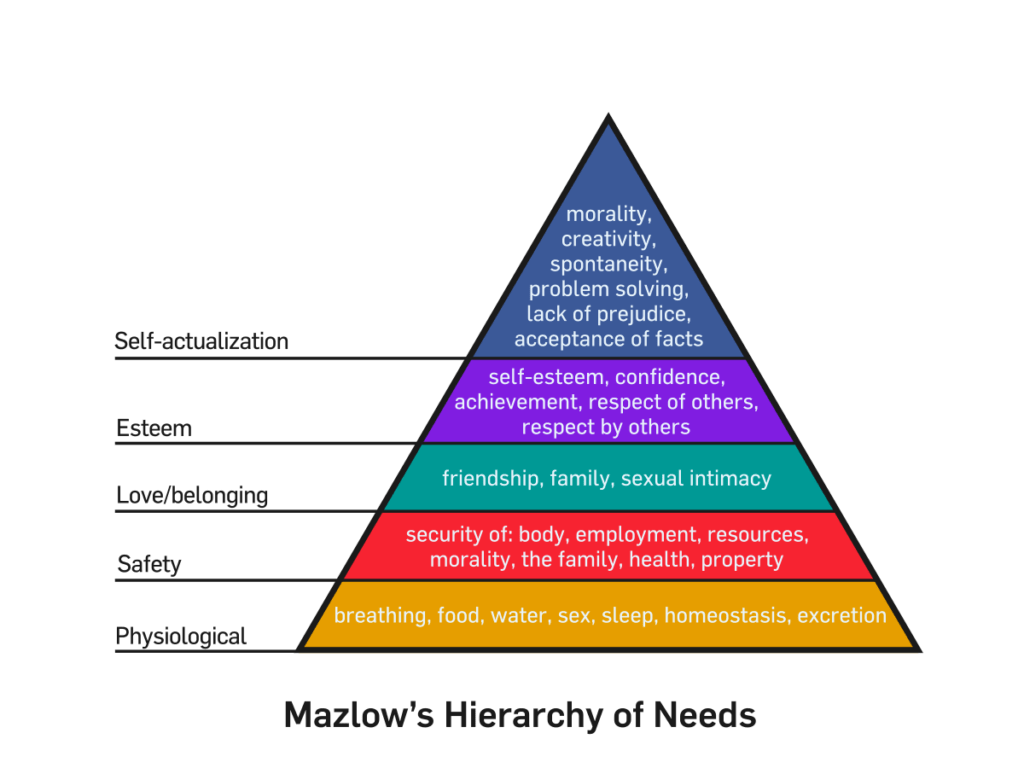Without clear business goals or a clear vision, it can be nearly impossible to make any progress. Even when we take action and get things done, we may not be moving in the right direction and have to backtrack anyway. This is true for all aspects of our lives, from personal to professional to business.
However, to create a clear vision, we need to have a clear understanding of the hierarchy and importance that we place on each task. Using ‘Maslow’s Hierarchy of Needs’ we can get an understanding of how important a specific task might be. According to his hierarchy, you need to have your base needs fulfilled prior to moving upwards and fulfilling more complex needs. In other words, we have to have the lower things on the hierarchy taken care of: our basic needs of shelter, food, and security. Then social needs and self-esteem needs, before reaching the final stage of self-actualization.

Define Your Goals for Your Business
In business, it is the same. Just like a person must be able to envision the person they can be when they climb the pyramid to self-actualization, a business owner and the business must have a clear purpose and vision to progress. Being in alignment with your highest or true purpose gives you clarity and personal freedom to pursue your vision, even when you are still working on your basic needs. Once you have defined your purpose, you can be assured that your work on the basics of your business will help it reach its full potential. Without this, one will experience disorder and/or confusion in mind, actions, and purpose.
In the end, we have to work on both at the same time – establishing and maintaining a vision/purpose, while we also focus on eliminating the clutter that is impeding us from maximizing our potential.
Visualize Your Purpose
Consider the following questions:
- What legacy would you be happy to leave behind?
- What do you want your business to be known for?
- What is the real reason you went into business?
- What would you do if you knew you couldn’t fail?
Once you have defined your vision, visualize how it will feel to achieve it. Visualizing every aspect of the achievement gives you an idea of how you will feel when you finally reach your business goals. This process of daydreaming, tasting, and feeling the goal helps motivate and inspire us to continue to work and sacrifice to make it happen.

Following Your Business Goals
Clarifying your purpose can help you clear the fog and identify the clutter that might be building up in your business. We start to see the work that will help us move towards our goal and what work is simply blocking our path and making it harder to achieve those business goals. Clutter is often seen as repetitive tasks that might be necessary to get done, but take up far more time than you should be committing to the task (80-20 rule). Clearing that Clutter will often mean finding ways to optimize your workflow, taking less time to complete repetitive tasks, and spending more time on improving your business.
To do all of this together can take a lot of time and effort. We do not gain clarity, direction, and purpose immediately. It is a process and often requires much soul-searching. As a leader, we must be willing to put the time and effort into this process to understand ourselves, our business, our true desires/values, our business’ desires/values, and where we want to be in the future.
Making Necessary Changes
I once worked with Frank who had owned his own business for four years. He was burnt out and frustrated with the lack of success in his business. We started to assess the issues and gaps in the business and ways for him to improve his business. However, it quickly became clear that Frank did not have a clear purpose and vision for this business.
We went back to the basics and Frank worked on his clarity of purpose and his vision. After two weeks, Frank clearly stated he wanted to sell the business and go in a different direction. He did not want to grow the business and he did not want to be in the industry he was in. That clarity and realization was both scary and liberating to him: scary to deviate from everything he had focused on for the last 4 years; liberating because he was full of ideas, enthusiasm, and motivation to start a new chapter in his life and career.
I am glad to say that for most clients it is not a 180-degree change, rather it is usually a 5- to 10-degree change that helps them as they gain clarity and shred off the unnecessary clutter they previously had, so they can move forward with more clarity of purpose.
It was great seeing how much work you put into it. Even though the design is nice and the writing is stylish, you seem to be having trouble with it. I think you should really try sending the next article. I’ll definitely be back for more of the same if you protect this hike.
The articles you write help me a lot and I like the topic
Awesome! So glad they are helpful. And figuring out your business goals and vision is so important. Good luck on your journey!
Pingback: How To Grow Your Business: Invest in the Value of Your Business
Pingback: A Business Plan: Things to Consider When Starting Your Business - Weaver Business Coaching
Your articles are extremely helpful to me. May I ask for more information?
Comments are closed.